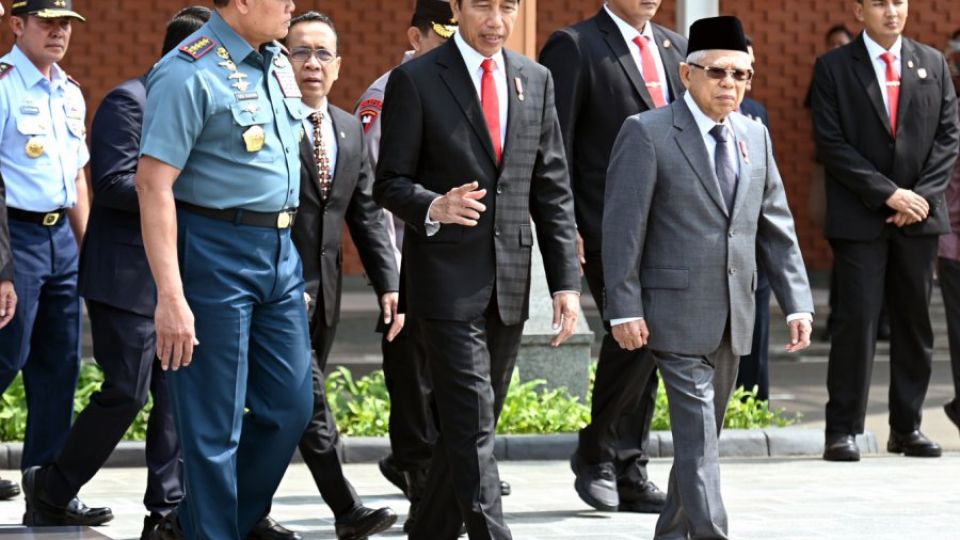July 4, 2023
JAKARTA – Advancing Indonesia’s economic interests were at the forefront of President Joko “Jokowi” Widodo’s list of priorities this week, as he embarked on a three-day working visit to Australia, the world’s largest supplier of a key component in electrical vehicle (EV) batteries, lithium.
Having recently softened his stance on Canberra’s efforts to bolster its regional security strategy, Jokowi said that solidifying the economic relationship between the two neighbors was paramount to the “strategic” relationship.
Indonesia, tied with Australia as holders of the world’s largest nickel reserves, has been adamant about developing its downstream mineral industries and eyeing investment in battery production from foreign EV carmakers, but the policy has run up against some opposition and prompted the European Union to launch World Trade Organization (WTO) action against Jakarta over its nickel ore export ban.
Jakarta’s plan, included in last month’s final draft of the 2025-2045 National Long-Term Development Plan, sought to elevate Indonesia into a high-income country by capturing the lion’s share of the EV battery value chain.
Yet lithium, a mineral scarce in Indonesia, remains a missing element in Jokowi’s grand plan, a gap he had previously attempted to fill. At last year’s Business 20 (B20) Summit in Bali, Jokowi made his first attempt to woo Prime Minister Anthony Albanese into joining forces, a pitch that may be revisited during his current trip, analysts suggested.
“This trip holds a significant strategic value for Indonesia,” he said at Halim Perdanakusuma airport in Jakarta, ahead of his flight.
With Jakarta’s top trade officials as part of his entourage, Jokowi said he would be meeting Australian Governor-General David John Hurley as well as a slew of Australian business magnates, noting that investment and trade would be among the most important topics to be discussed.
Australia remained among Indonesia’s most strategic economic partners, he asserted, with last year’s bilateral trade value amounting to US$12.6 billion, according to United Nations Comtrade data, a record high since 1989.
The Indonesia-Australia Comprehensive Economic Partnership Agreement (IA-CEPA), which came into force in 2020, has played a crucial role in enhancing trade relations between the two countries via tariff elimination and the ceasing of other technical barriers.
Ahead of Jokowi’s journey, Albanese on Friday released a statement to affirm Australia’s reception, saying that he was “delighted to welcome [his] friend” to Sydney to further build cooperation on key issues including climate change, economic development, education and regional security issues.
“Our region’s prosperity and stability requires collective effort and responsibility – that’s why Australia is committed to being a strong partner to our friends and neighbors in Southeast Asia,” Albanese stated.
Foreign Minister Retno Marsudi and Coordinating Economic Minister Airlangga Hartarto, who are already in Sydney awaiting Jokowi’s arrival, on Monday met with Indonesian businessmen in Sydney’s Livingstone Warehouse, a depot holding tens of thousands of commodities ranging from food products to furniture sold by Indonesia’s diaspora population.
Also journeying to Australia are Investment Minister Bahlil Lahadalia and Coordinating Maritime Affairs and Investment Minister Luhut Pandjaitan, who have been promoting Indonesia’s interest in procuring lithium.
Money moves
Jokowi’s Sydney trip, which will be followed up by a reciprocal state visit to Papua New Guinea, was initially overshadowed by looming regional security concerns involving Australia’s decision to acquire nuclear-powered submarines from the United States and the United Kingdom to counter China’s growing influence. However, experts have observed Jakarta’s softening stance toward Canberra’s decision.
Rough patches in Indonesia and Australia’s relationship are an ordinary phenomenon, they asserted, and current disagreements involving security strategies were unlikely to dominate the high-level talks or strain ongoing negotiations.
After all, Jokowi is an economic-minded leader, the experts said.
“For Jokowi, regional security is a necessary precondition for prosperity – it is a means to an end. […] I don’t think he will focus much on regional security, the threat of China or any geostrategic issues,” Dewi Fortuna Anwar, a senior international relations expert from the National Research and Innovation Agency (BRIN), told The Jakarta Post on Monday.
“Jokowi is not interested in security for the sake of security. He wants to focus on how security can enhance economic prosperity.”
The President’s three-day trip, which will conclude on Wednesday, will be followed by a trip to attend the first Indonesia-PNG Business Forum in Port Moresby. He will then return to Indonesia, making a stopover in Papua.


